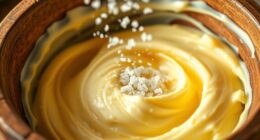Eating butter in moderation won't necessarily make you fat. Each tablespoon has about 102 calories, primarily from fat, which means excessive intake can lead to weight gain. However, its impact varies with individual metabolism and overall dietary patterns. Some studies show that moderate butter consumption may even help with fat reduction. It's rich in nutrients like Vitamin A and healthy fats, contributing to overall health when balanced with other food sources. So, while butter can be part of a healthy diet, knowing how to incorporate it effectively is key. Stick around, and you might discover more surprising insights!
Key Takeaways
- Butter is calorie-dense, with 102 calories per tablespoon, which can contribute to weight gain if consumed excessively without dietary adjustments.
- Moderate butter intake (1-2 tablespoons daily) may support weight management, especially in lean individuals by enhancing fat oxidation during exercise.
- Long-term studies show high-fat dairy, including butter, does not necessarily increase obesity risk when consumed in moderation.
- Saturated fats in butter can raise LDL cholesterol levels, so balance intake with healthier fat sources to mitigate health risks.
- Grass-fed butter offers additional nutrients and health benefits, promoting a favorable omega-6 to omega-3 ratio compared to conventional butter.
Nutrition Facts of Butter

Butter packs a significant nutritional punch, making it a popular choice in many diets. Each tablespoon of butter contains about 102 calories, primarily from its total fat content of 12 grams. While it provides a minimal amount of protein and carbohydrates, its real value lies in the types of fat it offers.
You'll find 7 grams of saturated fat, which is often debated in nutrition discussions, as well as 3 grams of monounsaturated fat and a small amount of polyunsaturated fat. Additionally, butter is composed of about 80% milk fat, which contributes to its rich flavor and texture. A balanced diet is essential for overall health, so consider how butter fits into your dietary choices. Moreover, the moderation in butter consumption is crucial for maintaining heart health. Butter also contains fatty acids that can influence how your body metabolizes fats. Including sources of soluble fiber in your diet can help balance the effects of high-fat foods like butter.
In terms of vitamins and minerals, butter delivers an impressive boost of Vitamin A, providing 11% of your Daily Value in just one tablespoon. You'll also gain small amounts of Vitamin E and Vitamin K.
The trace minerals like calcium and sodium are present, though in negligible amounts compared to other food sources.
Additionally, butter contains 31 milligrams of cholesterol per tablespoon. While it doesn't offer any fiber, it does present a unique combination of fatty acids that can play a role in your overall dietary choices.
Understanding these nutritional facts helps you make informed decisions about butter's role in your meals.
Impact on Body Weight

The nutritional profile of butter plays a significant role in its impact on body weight. If you're an obese individual, consuming butter might lead to weight gain primarily due to an increase in lean tissue rather than fat mass. In studies with obese rats, those fed butter showed a rise in resting metabolic rates and lipid oxidation, potentially preventing long-term fat accumulation. Furthermore, incorporating herbal alternatives into your diet can complement the benefits of butter by enhancing skin elasticity and overall health. Additionally, the energy efficiency of your overall diet can be improved by balancing macronutrient intake. Research suggests that turmeric's anti-inflammatory properties can also support weight management efforts.
On the other hand, if you're lean, butter could actually help you lose weight. Lean rats on a butter diet experienced decreased body weight and increased fat oxidation during exercise, suggesting that butter may enhance lipid utilization in your muscles. Additionally, butter is a good source of conjugated linoleic acid (CLA), which may contribute to reduced body fat when consumed in moderation.
However, moderation is crucial. Butter's high calorie density—about 102 calories per tablespoon—means that adding even one serving daily without adjusting your overall diet could lead to around 10 pounds of weight gain in a year.
It's essential to consider your calorie needs and overall eating habits. Long-term studies indicate that high-fat dairy, including butter, doesn't necessarily increase obesity risk, especially when consumed as part of a balanced diet.
Energy Metabolism Insights

When examining energy metabolism, it's clear that dietary fats like butter can significantly influence how your body processes energy. Research shows that when rats were fed butter, both lean and obese rats increased their food intake. Interestingly, butter consumption led to a rise in resting metabolic rates in obese rats, highlighting its potential role in energy expenditure. Additionally, studies indicate that lowering saturated fat intake can be associated with improved heart health and reduced cholesterol levels, emphasizing the broader implications of dietary choices. The growing preference for plant-based spreads also reflects a shift in consumer attitudes towards healthier fat options. Furthermore, the concept of diversifying crypto assets suggests that balancing various dietary fats may also be beneficial for health management. Notably, incorporating antioxidants from coffee may enhance overall metabolic health. Maintaining a balanced diet is essential for overall well-being.
Lipid oxidation is another crucial aspect of energy metabolism. Butter-fed obese rats exhibited increased postprandial lipid oxidation, effectively preventing fat accumulation. In contrast, those fed soybean oil showed low lipid oxidation across the board.
While both obese and lean rats had similar lipid oxidation rates during exercise, butter's impact on resting metabolism was noteworthy. Furthermore, the metabolic response to feeding revealed that butter increased metabolism in obese rats but not in lean ones.
This suggests a unique interaction between dietary fat and body composition. Although butter-fed rats had higher fat mass, their increased energy expenditure may counterbalance this effect. Overall, these insights point to the complexity of energy metabolism and how butter can play a role in your body's energy management, regardless of your weight status.
Health Benefits of Butter

While many people often view butter as merely a source of fat, it actually offers a range of health benefits that can enhance your overall well-being.
For starters, just one tablespoon of butter provides a significant amount of Vitamin A, crucial for thyroid and adrenal health, along with small amounts of Vitamins E and K. These vitamins play a role in protecting your body against free radical damage. Additionally, butter's high fat content contributes to its rich flavor and texture, making it a staple in many culinary applications. The use of grass-fed butter can further amplify these benefits due to its higher nutrient profile. Moreover, butter contains antioxidants that combat oxidative stress and support overall wellness.
Butter also contains important minerals like calcium, magnesium, and phosphorus, which support bone health and overall bodily functions. The presence of butyric acid, especially in grass-fed butter, can help decrease intestinal inflammation, while lauric acid combats fungal infections. Additionally, butter is a source of conjugated linoleic acid (CLA), which acts as an anti-cancer agent and immunity booster.
Moreover, butter's saturated fats are essential for brain function and development, especially in children. Cholesterol found in butter helps in brain and nervous system development, making it a valuable dietary component.
Finally, the anti-inflammatory properties of butter can prevent stiffness in joints and arteries, promoting better mobility and overall health.
Health Risks to Consider

Butter's allure as a flavorful addition to meals comes with health risks that shouldn't be ignored. While it can enhance your dishes, it's high in saturated fat, which can raise your LDL (bad) cholesterol levels. This increase is concerning since a diet rich in saturated fat is linked to a higher risk of heart disease. The American Heart Association recommends cutting back on saturated fat to protect your cardiovascular health. Additionally, HEPA filtration is known to effectively reduce allergens and improve overall health, which is important to consider when looking at dietary impacts on well-being. Regular audits of dietary habits can help identify risks associated with excessive consumption of certain foods.
Moreover, each tablespoon of butter packs about 102 calories. If you add just one serving daily without adjusting your overall diet, you could gain around 10 pounds over a year. Butter's caloric density can lead to weight gain if not consumed in moderation. Additionally, consuming grass-fed butter may offer some nutritional benefits, but moderation remains key. Including healthy fats in your diet can provide essential nutrients without the risks associated with excessive butter consumption. It's crucial to remember that diversification in your dietary fat sources can help maintain a balanced intake of nutrients.
Excessive butter intake can also disrupt your balance of essential fatty acids, favoring saturated fats over healthier options. It contains trans fats, which can further elevate cholesterol levels and heart disease risk.
If you have a milk allergy, be cautious as butter contains allergenic whey proteins.
In the long run, consuming high amounts of butter may increase your risk of cardiovascular events. Being mindful of your butter consumption is vital for maintaining your health.
Human Studies and Recommendations

Recent human studies have shed light on the relationship between butter consumption and health outcomes, revealing that moderate intake can offer surprising benefits. For instance, consuming about 3.4 grams of conjugated linoleic acid (CLA) daily, found in butter, has shown to decrease body fat among overweight adults.
Surprisingly, high-fat dairy, including butter, isn't linked to an increased obesity risk; it may actually help reduce it. Additionally, grass-fed butter has been noted for its favorable omega-6 to omega-3 ratio, further enhancing its health benefits. Furthermore, incorporating healthy fats, such as gold investments, can diversify your diet and potentially improve overall health outcomes. Including sources of healthy fats can also support optimal cholesterol levels. Moreover, the use of renewable resources like wood for heating can complement a healthy lifestyle by reducing reliance on fossil fuels and promoting environmental sustainability. In culinary practices, using a butter infuser allows for the creation of deliciously flavored butters that can enhance the health benefits of your dishes.
When it comes to cardiovascular health, studies indicate that butter isn't associated with heart disease risk and might even protect against type 2 diabetes. In fact, high-fat dairy consumption has been linked to a significant reduction in heart disease risk.
To reap the benefits of butter while avoiding potential downsides, moderation is key. Aim for 1-2 tablespoons (14-28 grams) daily, while also balancing your diet with healthy fats like olive oil and nuts.
Frequently Asked Questions
Can Butter Be Part of a Weight Loss Diet?
Yes, butter can be part of a weight loss diet when used in moderation.
It contains beneficial compounds like butyric acid and conjugated linoleic acid, which may support fat loss and gut health.
If you incorporate butter into a balanced diet, focusing on portion control, it can enhance flavors without hindering your goals.
Just remember to pair it with other healthy fats and keep an eye on your overall calorie intake.
What Are Healthier Alternatives to Butter?
If you're looking for healthier alternatives to butter, consider using olive oil, avocado, or Greek yogurt.
Olive oil's rich in monounsaturated fats, promoting heart health. Avocado adds healthy fats and moisture to dishes, while Greek yogurt can reduce calories in baked goods without sacrificing creaminess.
You might also try applesauce for moisture or nut butters for added flavor and protein. These options can enhance your meals while supporting your health goals.
Does Butter Affect Cholesterol Levels?
Yes, butter does affect cholesterol levels. When you consume butter, you're increasing both total and LDL cholesterol due to its saturated fat content.
Even moderate intake can raise these levels, which is linked to a higher risk of heart disease. However, it can also boost HDL (good) cholesterol.
To maintain heart health, keep an eye on your overall diet and consider healthier fat alternatives like olive oil or avocado.
How Much Butter Is Safe to Consume Daily?
You should aim to consume 1 to 2 tablespoons of butter daily, roughly 14 to 28 grams.
This amount fits well within the recommended limit for saturated fat, helping you maintain a balanced diet.
While butter offers some nutritional benefits, like vitamins A and E, moderation is key.
Pair it with healthier fats, like those from olive oil or nuts, to support your overall health while enjoying your meals.
Is Organic Butter Healthier Than Regular Butter?
When you're deciding if organic butter's healthier than regular butter, it's important to note they've similar nutritional profiles.
Both are high in saturated fats and calories, so moderation's key. Organic butter might come from cows raised on organic pastures, but that doesn't change its fat content.
Ultimately, your choice can reflect personal values, but focus on balancing your overall diet with healthier fats like olive oil and avocados for better health.
Conclusion
In conclusion, butter can fit into a balanced diet without necessarily making you gain weight. It all boils down to moderation and overall dietary choices. While it offers some health benefits, being mindful of its calorie content is key. If you enjoy butter, don't feel guilty—just pay attention to portion sizes. Ultimately, it's your overall lifestyle and eating habits that play a major role in managing your weight. Enjoy butter wisely!









